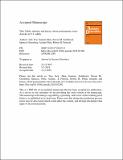Files in this item
Public attitudes and literacy about posttraumatic stress disorder in U.S. adults
Item metadata
| dc.contributor.author | Tsai, Jack | |
| dc.contributor.author | Shen, Jianxun | |
| dc.contributor.author | Southwick, Steven M. | |
| dc.contributor.author | Greenberg, Spencer | |
| dc.contributor.author | Pluta, Aislinn | |
| dc.contributor.author | Pietrzak, Robert H. | |
| dc.date.accessioned | 2019-08-25T23:39:52Z | |
| dc.date.available | 2019-08-25T23:39:52Z | |
| dc.date.issued | 2018-04 | |
| dc.identifier | 252394209 | |
| dc.identifier | 81e39052-b946-4ec0-acda-5bb9a44e3509 | |
| dc.identifier | 85042868905 | |
| dc.identifier | 000429758800009 | |
| dc.identifier.citation | Tsai , J , Shen , J , Southwick , S M , Greenberg , S , Pluta , A & Pietrzak , R H 2018 , ' Public attitudes and literacy about posttraumatic stress disorder in U.S. adults ' , Journal of Anxiety Disorders , vol. 55 , pp. 63-69 . https://doi.org/10.1016/j.janxdis.2018.02.002 | en |
| dc.identifier.issn | 0887-6185 | |
| dc.identifier.other | RIS: urn:B187E9281A5F3474C83014D0102388F8 | |
| dc.identifier.uri | https://hdl.handle.net/10023/18370 | |
| dc.description | Funding for this study was provided by the Clinical Neurosciences Division of the National Center for Posttraumatic Stress Disorder and a private donation. The work was supported by the Department of Veterans Affairs, Veterans Health Administration, Office of Research and Development. | en |
| dc.description.abstract | There has been little study of public literacy regarding posttraumatic stress disorder (PTSD). Public knowledge and attitudes about PTSD are important for encouraging treatment, prevention, and informing policies. Using a national online survey of 541 adults across 47 U.S. states in November 2016, we assessed attitudes and knowledge about PTSD. Most notably with respect to attitudes, 76–94% of the sample endorsed more federal funding for research, training, and practice for PTSD; and 76% of the sample also believed people with PTSD should have restricted access to firearms. With respect to knowledge, participants demonstrated good general knowledge about PTSD, but tended to overestimate the rate of PTSD and trauma exposure, and demonstrated little knowledge about effective treatments. Sociodemographic characteristics and political affiliation were associated with PTSD knowledge and attitudes, but clinical characteristics did not explain much additional variance. Together, these findings suggest that there is strong public support for research and practice related to PTSD, but little public knowledge about evidence-based treatments for this disorder. | |
| dc.format.extent | 465744 | |
| dc.language.iso | eng | |
| dc.relation.ispartof | Journal of Anxiety Disorders | en |
| dc.subject | Posttraumatic Stress Disorder | en |
| dc.subject | Health Literacy | en |
| dc.subject | Prevention | en |
| dc.subject | Trauma | en |
| dc.subject | Public Policy | en |
| dc.subject | H Social Sciences (General) | en |
| dc.subject | RA0421 Public health. Hygiene. Preventive Medicine | en |
| dc.subject | BF Psychology | en |
| dc.subject | RC0321 Neuroscience. Biological psychiatry. Neuropsychiatry | en |
| dc.subject | NDAS | en |
| dc.subject | SDG 3 - Good Health and Well-being | en |
| dc.subject.lcc | H1 | en |
| dc.subject.lcc | RA0421 | en |
| dc.subject.lcc | BF | en |
| dc.subject.lcc | RC0321 | en |
| dc.title | Public attitudes and literacy about posttraumatic stress disorder in U.S. adults | en |
| dc.type | Journal article | en |
| dc.contributor.institution | University of St Andrews. School of Earth & Environmental Sciences | en |
| dc.identifier.doi | 10.1016/j.janxdis.2018.02.002 | |
| dc.description.status | Peer reviewed | en |
| dc.date.embargoedUntil | 2019-08-26 |
This item appears in the following Collection(s)
Items in the St Andrews Research Repository are protected by copyright, with all rights reserved, unless otherwise indicated.

